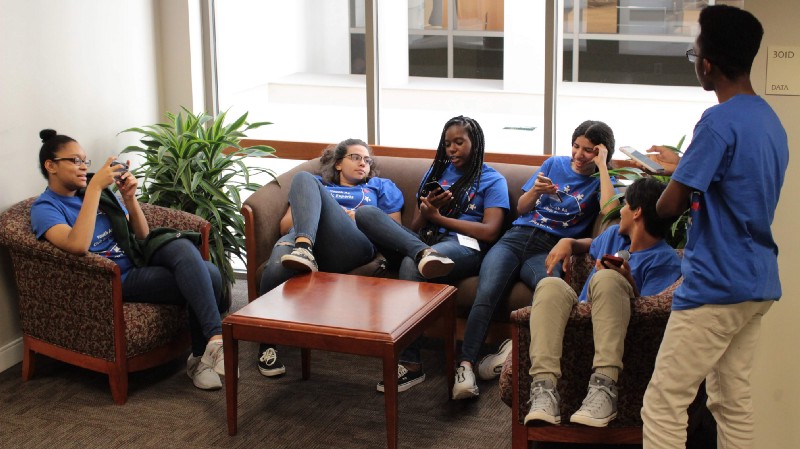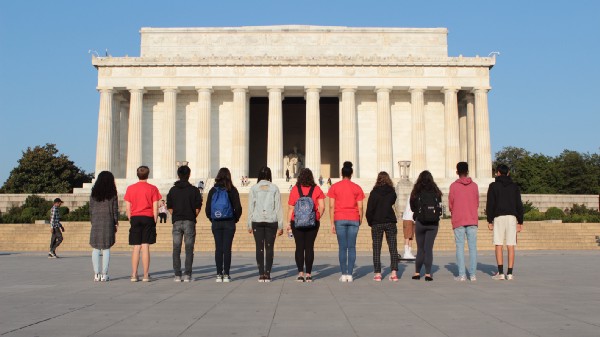
Over the past school year, 20 high school students took part in the inaugural Equity in Civics Youth Fellowship and Youth As Civic Experts Network. The program stemmed from a collaborative effort between iCivics and Generation Citizen to explore and define equity in civic education. The fellowship and youth network brought together students from diverse backgrounds — most from urban and rural schools — for a series of workshops to explore how to make civics more inclusive and relevant to Americans of all backgrounds, and to learn skills that would help them become civic leaders. Funded by the William and Flora Hewlett Foundation, the fellowship and the network are part of a broader initiative to explore the challenges that civic education has when it comes to diversity.
Throughout the year, the fellows worked on group projects around advocacy, engaged in group discussions on equity, civic education, civic engagement, and designed civic action projects around the upcoming census and voter engagement. Over the past month, many of the fellows on their own, have taken part in protests and civil action on racism in the aftermath of the killing of George Floyd. For this month’s member spotlight, we wanted you to hear from a few of these students about why this moment has been so important to them.
Q: What was your first experience with racism?
Paris Mathews (Las Vegas, NV, rising senior): When I was in first grade, other girls called me “dirty” and “ugly” and didn’t want to play with me because I was Black. One of the girls tried to cut my hair because I looked pretty on picture day. Then, my teacher told my parents I had to be put into special needs classes, even though I was perfectly capable of taking the regular course like everyone else.
Alexandra Henderson (Baton Rouge, LA, rising senior): I was 4 years old. I went to a predominately White Catholic school. Two of my classmates and I were talking, and they wanted to come up with nicknames. They called themselves something along the lines of “vanilla princesses.” They called me “mud girl.” I went home, told my mom, and she explained to me that what they said was not a compliment. They were calling me names because I am Black. I never forgot that moment, and I don’t think my mom did either.
Marcus McNeill (Boston, MA, rising junior): When my sister (who is a veteran) was followed around in a department store by an employee.
Rachel Roncka (Boston, MA, rising junior): Being biracial, it can sometimes be difficult to identify racism in others’ interactions with you. It usually comes in more subtle forms, stemming from the idea that Asian-Americans are somehow “other” or “different.” I saw this in the media, in how teachers favored White students and mixed up the names of Asian students, and it even caused me to try to distance myself from my Chinese identity when I was younger.
Q: How are you experiencing this moment right now?
Paris Mathews: Seeing my people die not only at the hands of the police, but also from the coronavirus upsets me. There are more Black people dying from the virus than those from other races, and that is confusing and concerning. Then seeing Black men and women being killed for little things just makes me sick. I’m scared for my father, my brother, and my cousins. I don’t want them to be next, nor the women in my family. I don’t even feel safe at home, not because of the home itself but because people everywhere, who don’t even know me, want me dead.
Alexandra Henderson: I feel like at every turn, I am being told that my life is worthless. I see people on Twitter screaming so passionately that they hate Black people, and they get to go to college with no consequences. When I bring awareness to these issues, I’m told that I’m being dramatic, that I am an angry Black woman, or being called radical. I didn’t know that fighting to live a better life without fear and prejudice made me radical, or that just asking to be equal and valued is some abstract concept that people obviously don’t understand.
From a young age, I was told to rise above adversity, to be better than racism, to kill them with kindness. But when police are killing Black people on the streets, are they killing them with kindness or killing them with prejudice? When I accidentally bump into someone at the store, and I am accused of trying to steal from them, is that rising above racism or is that perpetuating it? When people yell and scream at Latinos for speaking Spanish in public, are we being accepting, or are we forcing people to assimilate into a culture that treats them like animals out of fear?
I am feeling a lot of emotions right now, and the most prominent one is disgust. It is 2020, but people in America act like it’s 1920. It’s 2020, and I’m scared that if my mom and grandma speak Spanish in public, someone will accost them. It’s 2020, and I’m scared that I’ll still be called a “n****r.” It’s 2020, and I feel like I can’t live my life. It’s 2020, and I can’t be Black or Hispanic without people telling me how “well spoken” I am. It’s 2020, and people are surprised when I tell them I want to go to law school. It’s 2020, and I am tired of having to prove time and time again that my life is valuable.
Marcus McNeill: Some days I’m still at a loss for words, but right now my mind has been switching to more activism and advocating for the African American community and what I can do to continue doing my part.
Rachel Roncka: I want to do as much as I can to support the movement, but I can’t go to protests, so I am contributing by donating to organizations, signing petitions, emailing, and sharing resources online. I’ve had many important and long overdue discussions with friends, classmates, teachers, and family about racism in our society. I am working on teaching myself and my family more about the history of systemic racism in our country through the works of Black filmmakers, activists, and authors. We can never fully understand the experience of being Black in America, but we can listen, learn, and support the movement and the people whose lives it represents.
Q: What is your hope for the future?
 Paris Mathews: That one day there will be justice for all, that there will be no hidden racism in the justice system or any other system. That I can not have a breakdown every time I see a cop or if someone I’m with gets pulled over. That I don’t see another Black person die for holding a hairbrush, or reach for their ID, or anything else. I hope that, when we say that we can’t breathe, they’ll listen.
Paris Mathews: That one day there will be justice for all, that there will be no hidden racism in the justice system or any other system. That I can not have a breakdown every time I see a cop or if someone I’m with gets pulled over. That I don’t see another Black person die for holding a hairbrush, or reach for their ID, or anything else. I hope that, when we say that we can’t breathe, they’ll listen.
No. I hope the police don’t use the chokehold position anymore.
I hope we don’t need the Black Lives Matter movement anymore because everyone finally agrees that we do matter. I hope that there’s no more White privilege and that we have the same playing field as them, that I don’t have to worry about getting an opportunity because of my skin, that the stereotypes end, and that we love each other. I hope that there will be peace and actual freedom in America.
Alexandra Henderson: My hope is that people open their eyes and consider what they have done to contribute to this situation. I hope that the Black community can unify. I hope people will stop measuring each other’s blackness. I hope that I can just be a person. I hope people see me for who I am, and do not judge me because I am Black. I hope that another Black person doesn’t have to die to make people get it. I hope I can live my life freely. Most of all, I hope that everyone I love can live without fear of being killed on the streets, shot by a police officer, or publicly executed because they were racially profiled. I want this world to change.
Marcus McNeill: We are the next generation that will pass laws and bills in order to make Black lives matter in our communities. Plus, making sure we are allocating money for urban extracurricular programs so that students are busy and learning something new at the same time.
Rachel Roncka: I hope the spirit and passion behind this movement remains strong, even if the outpouring of social media posts begins to slow. As time passes, I hope that everyone remembers the outrage of all these recent injustices, and that it fuels us to continue fighting and applying what we’ve learned. It seems like law enforcement and government leaders are really starting to listen, and I hope this leads to more systemic change to correct the generations of racial oppression.
What about this discussion resonates with you? Add your voice! Join the discussion on social media using #CivicsForUS.


 See All
See All